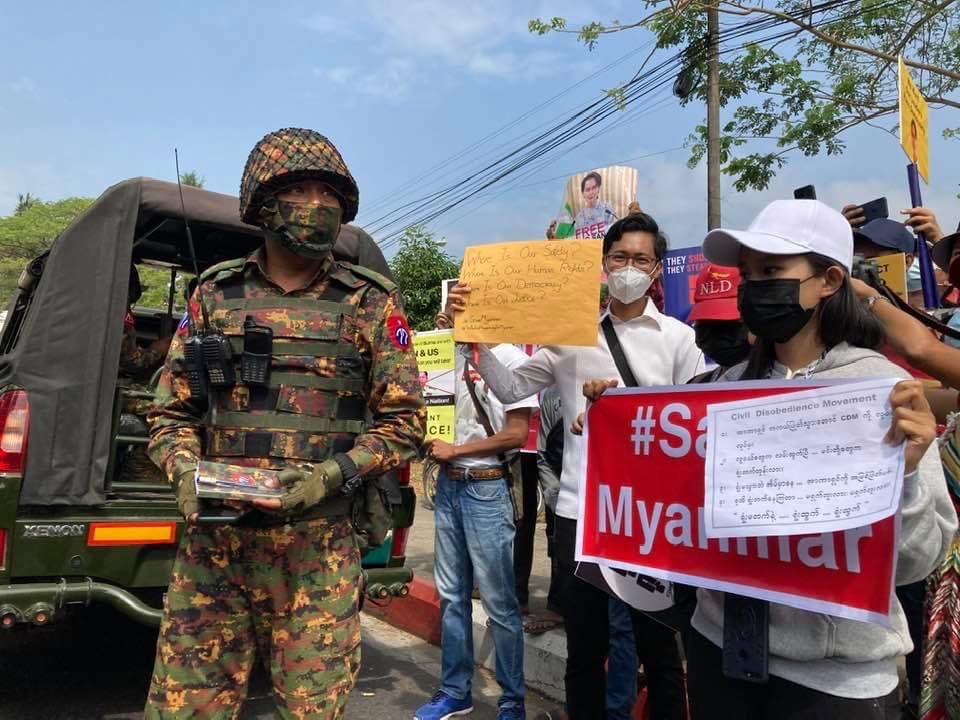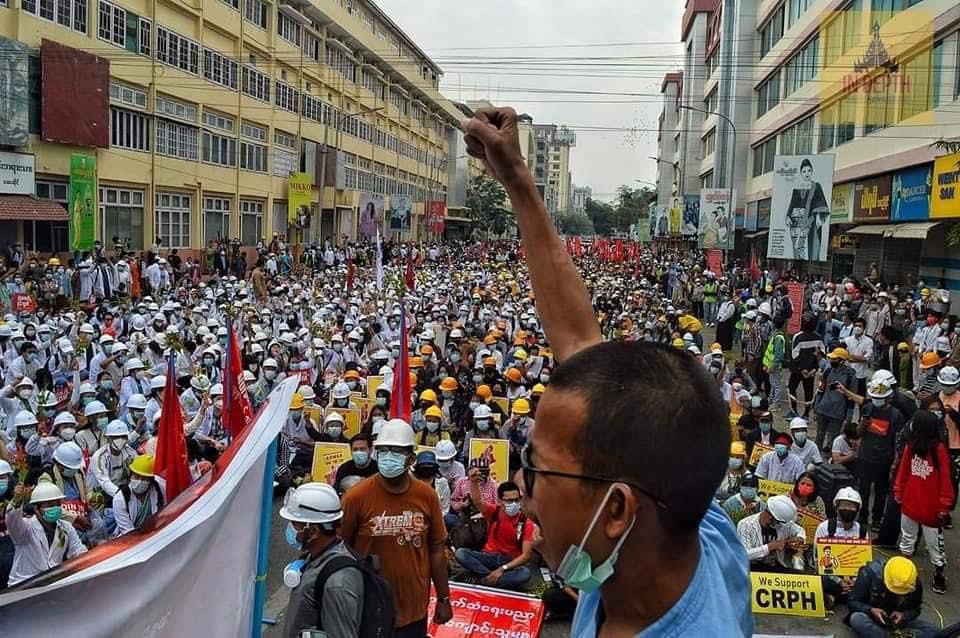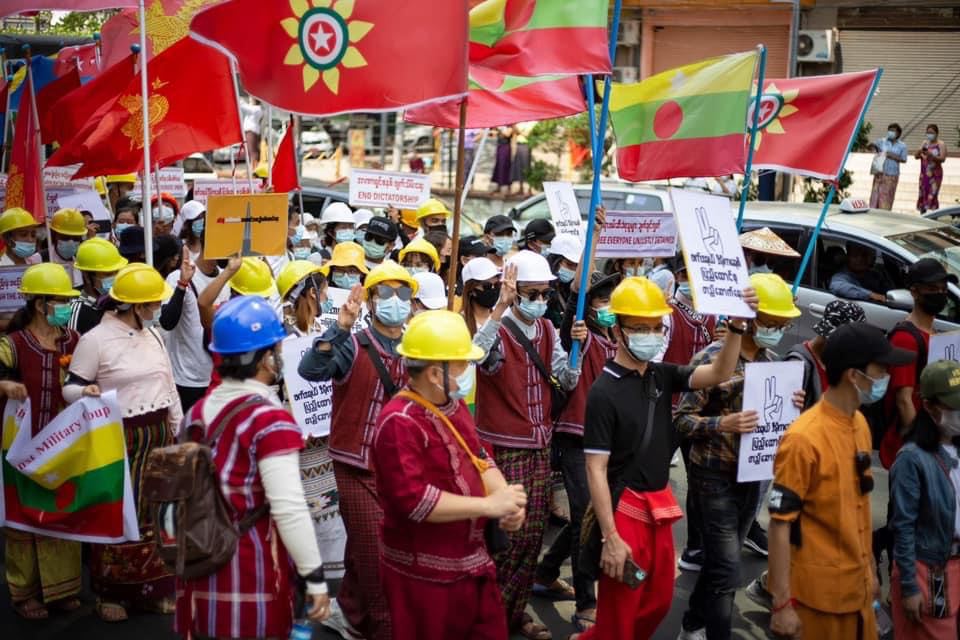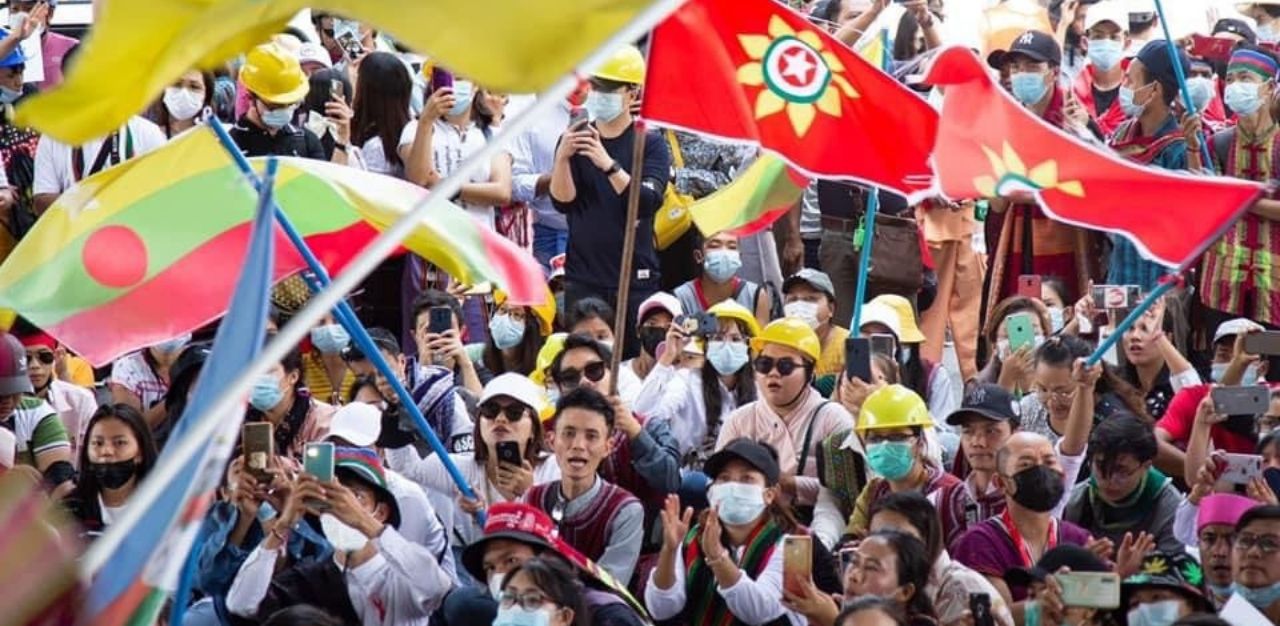When it broke…
1 February 2021, 7a.m.: The basement of my apartment reverberated with the sound of people running around, they were shouting: “The military has seized power”; “Mother Suu Kyi and President Win Myint have been arrested”; “They’ve turned internet off.”
A friend ran by, he said: “I can’t get any more calls.”
He looked desperate, as most of us were also, and some were already in tears.
I felt conflicted – I don’t know if I’m sad or not. Has this really happened? Why has this happened again? Why are our leaders so stubborn and arrogant that they put their pride and ego first?
Why did the coup happen?
The military, led by Senior General Min Aung Hlaing, ousted the civilian government headed by State Counselor Aung San Suu Kyi and President Win Myint.
This is the latest episode in a long-running civil-military crisis.
The military – known as the Tatmadaw – disputed the results of the 2020 general election that had been won by the National League for Democracy (NLD), led by Aung San Suu Kyi.
The 2020 elections handed NLD a bigger margin of victory compared to the previous election in 2015. Despite winning only 33 seats of the combined 664 available seats, the military pointed to more than 10 million disputed ballots due to duplication, overcrowding and disenfranchised voters under the age of 18.
READ: The 2021 Myanmar Coup: No End in Sight as Protests Take a Violent Turn
Was it expected?
Post the 2020 election, fears of a military coup began to arise among the people of Myanmar. Many remember the country’s difficult history when the military seized power and ruled from 1962 to 2011. This despite a general election in 1990 which the NLD, led by Aung San Suu Kyi, won 80 per cent of the seats but the military refused to cede power.
Political analysts had expected the coup following last November’s elections, especially after tensions escalated between the military and the civilian government. One analyst told me that the military was initially hesitant as they feared international and domestic pressure.
The timing
The new parliament was due to be sworn in on 1 February, and everyone was anxious the night before, hoping to get through the night and have peace of mind.
On 29 January, the Tatmadaw ordered armoured vehicles and armed forces to be on standby.
Some negotiations were reportedly held between the military and the civilian government-in-waiting. Despite these negotiations, the Tatmadaw, led by Senior General Min Aung Hlaing, decided to seize power at 4am.
READ: Myanmar Coup: ASEAN Response Shows Ray of Hope
Could the coup have been prevented?
A question many citizens, including those abroad, have been asking, whether this outcome could have been prevented.
On 29 January, leaders from the civilian government and the military met for talks but those ended without agreement. The issues at hand are complex and difficult to elaborate here, given Myanmar’s many factions and the power that lies with each faction.
There is contention that the coup could have been prevented but for stubbornness from all sides. Some analysts even say the coup scenario could have been dispelled had Aung San Suu Kyi met with Senior General Min Aung Hlaing. Meetings that were planned failed to materialise.

Similarly, the Union Electoral Commission (UEC), Myanmar’s national body for organising and overseeing the elections, could have been reconstituted or made efforts to review areas of dispute of voters’ eligibility.
Rather than negotiate a suitable, peaceful outcome, the country’s political elders chose to abandon talks and allow Myanmar to be dragged back into darkness.
How are people responding?
The coup has happened, and there is no doubt the coup leaders are prepared to defend it to the death, given their position of strength.
It is a precarious situation as opponents of the coup are also determined to demand a return of power to a civilian government. A civil disobedience movement (CDM) has been called for government and private employees to not work while the nation is under the coup d’état.
People took to the streets, beating on drums to cast out evil spirits, as instructed by traditional Myanmar custom. Peaceful non-violent marches were organised, including protests in front of international embassies.
Major cities in Myanmar have seen similar demonstrations being held as the people rise to oppose the coup, with cars parked on the streets and loudspeakers running to voice the people’s displeasure.
Protestors have attracted international attention by dressing up in style, using ridicule as a form of expression. Netizens have campaigned on Facebook, Twitter and Instagram to express their views when internet was restored.

The junta responded with tough measures in Mandalay and Naypyidaw as 20-year-old Mya Thwe Thwe Khaing became the first casualty of the protests, shot in the head and dying from her injuries days later while taking shelter in the capital city Naypyidaw. Deaths have also been reported in other towns as the military toughened its stance.
Imaginary and real fears amid the confusion
As is usual in times of crisis, information (or disinformation) becomes a tool. News spread of an amnesty that was apparently granted to 23,000 prisoners incarcerated for offences of varying severity. Following the rumoured amnesty, a series of arson attacks were reported in neighbourhoods across Myanmar.
People in the townships also fear their drinking water are being poisoned, and civilian patrols were set up to ensure security for the community. No one knows who the bad guys are or who hired them. But those who experienced similar sabotage during past uprisings fear a repeat of events.
Darkness beckons
Police cars are patrolling and making arrests, and the military have cracked down on members of the civil disobedience movement. In recent days, live rounds have been used on protestors as the coup leaders flexed their muscles.
Internet services continue to be disrupted while netizens work tirelessly to let the world know what is happening.
It seems Myanmar is walking back into the darkness, with the people fearing that the night will come and they will fall asleep.
People in Myanmar who do not want a military coup are wandering through the darkness, fearing the isolation of the world and the return to the dark days.
As they struggle to resist the military dictatorship during the day, they fear that the night will bring hell.
Do not abandon us
World, hear our plea.
The French philosopher Jean-Jacques Rousseau said: “Man is born free, and he is everywhere in chains.”

Myanmar has lived this experience many times over – in 1962, in 1988, in the 1990s and now in 2021.
The people of Myanmar know what it’s like to live under a military dictatorship, and it is more frightening than the COVID-19 virus. You can see that as the people of Myanmar cast aside their fears of COVID-19 to stand up against the military dictatorship.
In 2021, the people of Myanmar also want a 21st century life, not one dictated by an unbending military.
We do not wish to be left behind by the international community. We don’t want to be forgotten by the world, by even our closest neighbours in ASEAN, including Singapore, our closest partner.
Please do not abandon the younger generation of Myanmar. Help the people of Myanmar stand up for the right of self-determination.
Join the conversations on THG’s Facebook and Instagram, and get the latest updates via Telegram.




























